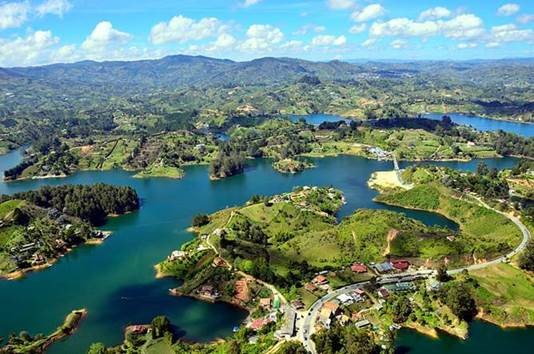Feb. 21, 2022
Dear
LIOS Confidential Reader,
I love the city of Medellín, and it's a major part of my personal retirement plan, so I tend to give it a lot of digital ink in this space...
But Colombia is a big, mega-diverse country... it's a place, I bet, where you could find your own personal Shangri-la.
 |
Colombia boasts many more options than
the "City Of Eternal Spring," Medellín...
|
For instance, I talk about the "perfect weather" we have up here in the mountains, but did you realize that Colombia has both Pacific and Caribbean coasts?
Indeed, the Caribbean coast here boasts some of the most unique and striking beaches I've come across…
And, if you're into historic, colonial cites,
Cartagena offers that… plus miles of famous white-sand beaches.
But head farther east along the coast, to the city of
Santa Marta, and you'll get the same beaches, along with the romantic colonial architecture, at a much lower cost.
If Santa Marta is considered the "next Cartagena," where then might the "next (and even cheaper) Medellín" be?
Look south, to the city of
Cali. While slightly warmer than Medellín, Cali is just as lush and vibrant. It's the "Salsa Capital Of The World," and local surveys even pin Cali as home to the country's most attractive people.
 |
Founded in 1525, Santa Marta is one of
the oldest cities in the Americas...
|
Looking for a combination of mountain weather and colonial architecture?
Try the under-the-radar and incredibly friendly town of
Popayán. You won't be disappointed.
Want to live in a highland town surrounded by deep blue waters...
One that looks like Switzerland but has a fraction the cost? Check out
Guatapé.
Beyond these cities (and many more), Colombia offers perks and advantages that will follow you wherever you decide to put down roots...
Here are 4 that I believe demand your attention right now:
- Health care in Colombia is world-class, but it'll cost you only 1/4 or less of what you'd pay in the United States... and, yes, plenty of English-speaking doctors can be found in the cities...
- The World Bank ranks Colombia as the #1 country in Latin America and the #6 country in the entire world for investor protection... that's better than the United States...
- The strength of the U.S. dollar (as well as Canadian dollar, to a lesser extent) is adding even more bargaining power to the already low cost of living... you can lock in the historic rate by purchasing a property or opening a bank account...
- The visa process is quick and cheap: You can qualify as a pensioner with an income of only US$750 a month... or you can invest as little as US$80,850 to obtain an investor visa. The clincher? You don't even need to hire a lawyer...
I could go on, but here's my point: If you haven't considered Colombia yet, you need to change that immediately...
Especially while the cost of living and of property here is a screaming bargain.
This spring, I am gathering my top experts in this country to host a program that reveals everything Medellín and the rest of Colombia has to offer...
Fast Track Your Goals In Colombia With #1 Event..
Early Bird Discount Expires Tomorrow My 2022
Live and Invest in Colombia Conference is the only event of its kind.
Get all of the insights and meet all of the people who can help get you the life you want in Colombia...
From sophisticated Medellín to Caribbean Cartagena, we'll have you covered no matter your goals and destinations in Colombia...
You'll learn everything you need to know to live or invest here, including:
- The best way to get a great deal on a rental or purchase... the strength of the U.S. dollar against the peso right now is creating unbelievable bargains...
- Your best options for health insurance in this country... this is inexpensive, world-class health care. In fact, 8 of the best hospitals in all of Latin America are here...
- How to open a bank account, for yourself or your business... plus, access to top contacts to help make the process a walk in the park...
- The top residency visa options and how to obtain them... Colombia boasts some of the cheapest and most hassle-free visas in the entire world...
- Several itemized budgets for day-to-day living, for those with budgets big and small... you could live a genuinely comfortable life here for under US$1,000 a month...
- Investment and business opportunities, including insights into the biggest market niches right now... plus, multiple high-yield plays that grant automatic permanent residency...
- Real-life tales of success and failure from expats already living and doing business in this emerging retirement and investment haven...
And much, much more... taxes, banking, financing, health care, health insurance...
Complete details on the property purchase process, how to handle mail delivery, how to ship your household goods, the best way to furnish your new home...
Helping your children adjust to a new life overseas, staying in touch with your grandkids back home...
This event will provide you everything you need to make decisions about your next step in this country.
If you're interested in joining us, do not delay...
The Early Bird Discount for this event expires tomorrow night. Go here now for full details about the event we've planned for you.
Sincerely,

Kathleen Peddicord
Founding Publisher,
LIOS Confidential P.S. After more than a decade spending our own time and money here, we know Colombia from an expat's view better than anyone else you're going to find.
We know the pitfalls and the risks, because we've suffered (or narrowly avoided) them ourselves.
We've met, vetted, and befriended dozens of locals and experts, and we know from firsthand experience that they can help you, too.
The Live and Invest Colombia Conference is a
revelation of our own hard-won wisdom, as well as the advice and the insights from other current expats and professionals in the country.
We've all chosen to live or invest here because it truly is one of the most pleasant places you'll ever know. And you'd be hard-pressed to find a more bargain property market.
Bottom line, this is the best option available for anyone interested in Colombia as a place to live, retire, or invest.
Sign up to join us within the next 48 hours, and you'll save US$200...
Please don't delay:
This significant discount expires tomorrow night.
Claim your 2022 Colombia Conference access now, here.
P.P.S. If you have questions, or if you'd prefer to register over the phone, contact us ASAP to ask your questions and to reserve your place in the room...
Reach us by email here, or by phone, toll-free, at
1-888-627-8834... or, internationally, at 1-443-599-1221.
Full details on pricing, discounts, travel, and hotel are here.


